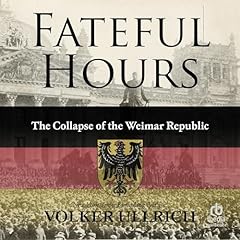
Weimar Germany
Promise and Tragedy, Weimar Centennial Edition
No se pudo agregar al carrito
Add to Cart failed.
Error al Agregar a Lista de Deseos.
Error al eliminar de la lista de deseos.
Error al añadir a tu biblioteca
Error al seguir el podcast
Error al dejar de seguir el podcast
 Exclusivo para miembros Prime: ¿Nuevo en Audible? Obtén 2 audiolibros gratis con tu prueba.
Exclusivo para miembros Prime: ¿Nuevo en Audible? Obtén 2 audiolibros gratis con tu prueba.Compra ahora por $24.94
-
Narrado por:
-
Robert G. Slade
-
De:
-
Eric D. Weitz
This audiobook narrated by Robert G. Slade paints a riveting portrait of the Weimar era.
Weimar Germany brings to life an era of unmatched creativity in the 20th century - one whose influence and inspiration still resonate today. Eric Weitz has written the authoritative history that this fascinating and complex period deserves, and he illuminates the uniquely progressive achievements and even greater promise of the Weimar Republic. Weitz reveals how Germans rose from the turbulence and defeat of World War I and revolution to forge democratic institutions and make Berlin a world capital of avant-garde art. He explores the period’s groundbreaking cultural creativity, from architecture and theater, to the new field of "sexology" - and presents richly detailed portraits of some of the Weimar’s greatest figures.
Weimar Germany also shows that beneath this glossy veneer lay political turmoil that ultimately led to the demise of the republic and the rise of the radical right. Yet for decades after, the Weimar period continued to powerfully influence contemporary art, urban design, and intellectual life - from Tokyo to Ankara and Brasilia to New York. Featuring a new preface, this comprehensive and compelling book demonstrates why Weimar is an example of all that is liberating and all that can go wrong in a democracy.
©2018 Eric D. Weitz (P)2020 Princeton University PressLos oyentes también disfrutaron:




















Reseñas de la Crítica
"[Weitz] bring[s] to bear his uncommon erudition and a prose style that is at once rigorous, wonderfully animated, and distinguished by breathtaking clarity." (Noah Isenberg, Bookforum)
"Weitz effortlessly blends politics and economics, philosophy and literature, art and architecture in a gripping portrait of a culture whose pathology was exceeded only by its creativity.... This is history at its best." (Josef Joffe, publisher and editor of Die Zeit and fellow of the Hoover Institution, Stanford University)
"Excellent.... [A] superb introduction...probably the best available." (Eric Hobsbawm, London Review of Books)
Las personas que vieron esto también vieron:


















Excellent and immersive
Se ha producido un error. Vuelve a intentarlo dentro de unos minutos.
An Amazing, Ultimate Guide to Weimar Germany 10/10
Se ha producido un error. Vuelve a intentarlo dentro de unos minutos.
Very good
Se ha producido un error. Vuelve a intentarlo dentro de unos minutos.
Interesting insight into the Zeitgeist of the Weimar Rep but weak in tying it together with the political machinations in the background.
Performance is borderline pathetic - A reader that is utterly incapable of pronouncing anything German is a disgrace - as a German speaker i couldn't understand anything this guy was saying - very distracting and doesnt do the material justice.
Narrow perspective on the history of Weimar
Se ha producido un error. Vuelve a intentarlo dentro de unos minutos.
As a historian, author Eric D. Weitz’s prejudices are that of the typical American academic: basically, he thinks the German Left didn’t go far enough during the Weimar years in challenging social and cultural norms. He shakes his head at Weimar’s positive obsession with making sex socially beneficial rather than just a source of private pleasure, and chides German intellectuals for their hand-wringing over the rise of modern mass entertainment (why can’t the workers just have a little fun?). His treatment of right-wing figures is usually somewhat sarcastic, although not the point of being unfair. He grants that German Christianity, for example, had moral resources that should have made them wary of Germany’s (often anti-Christian) far right, and even acknowledges that many right-wing ideologues (even among the Nazis) were well-educated and highly cultured rather than common thugs. Because Weitz makes no effort to conceal his biases, and makes use of extensive quotations to back up his interpretations, it doesn’t become a significant issue. Just be aware that that’s his general take on the Weimar culture wars.
I do have two issues with the narration by Robert Slade. First, he oversells the tone of pompous moralizing when reading statements from doctors, politicians, and (especially) clergy. It’s plain bad acting, and the producer really should have stepped in and told him to tone it down. The texts speak for themselves—and anyways, Weitz makes it clear when he quoting someone merely to highlight the absurdity of their views. Second, I have a suspicion Slade lied about being able to speak German in order to get this job, because he constantly trots out a labored pseudo-German accent and just as constantly mispronounces the German words and names he’s using. To give two examples from the chapter on the rise of the far right, he pronounces Franz von Papen as “pay-pen” (it should be “pah-pen”) and Reinhard Heydrich as “hay-drik” (it should be “high-drik”). Besides being slightly annoying, it’s distracting to hear someone who’s obviously faking his way through a narration job he wasn’t qualified for. This book deserves better.
Good Cultural History; Bad Narration
Se ha producido un error. Vuelve a intentarlo dentro de unos minutos.


